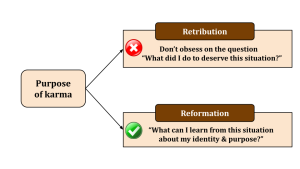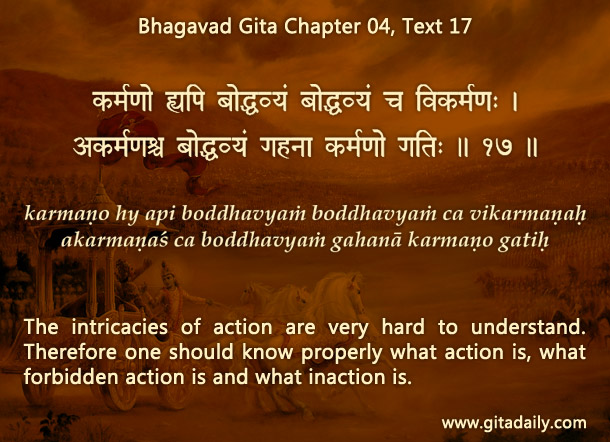 The Bhagavad-gita (04.17) states that the workings of karma can be incomprehensible. This speaks to our experience – we all are sometimes faced with adversities that beg the question, “What did I do in the past to deserve such trouble?” In fact, the Gita’s original student, Arjuna, faced a similar question. Though he had been a virtuous warrior throughout his life, he faced the anguishing prospect of fighting against his relatives, including his venerable elders.
The Bhagavad-gita (04.17) states that the workings of karma can be incomprehensible. This speaks to our experience – we all are sometimes faced with adversities that beg the question, “What did I do in the past to deserve such trouble?” In fact, the Gita’s original student, Arjuna, faced a similar question. Though he had been a virtuous warrior throughout his life, he faced the anguishing prospect of fighting against his relatives, including his venerable elders.
In addressing Arjuna’s agony, the Gita doesn’t go into any past-life stories about what he had done and what his opponents had done – and how all those actions had led them to their present fratricidal fight. Instead, the Gita uses Arjuna’s perplexity as a launching pad for discussing universal questions about human identity and purpose. It explains that we all are parts of the all-loving divine, Krishna (15.07) – and are meant to lovingly harmonize with his omni-benevolent will, thereby doing the greatest good in this world (12.13) and progressing toward the highest good beyond this world (18.65).
However, we presently have our own conceptions about our identity and our purpose – conceptions that misalign to varying degrees with our core identity and supreme purpose. Aligning our driving conceptions with reality is the ultimate purpose of existence – and of everything in existence, including the principle of karma.
When we understand this purpose, our approach to adversities changes: we focus forward, not backward. We refuse to get caught in a perpetual post-mortem mode when we can’t figure out the causes of our situations. Instead, we use the adversities as prompts to examine our present conceptions of our identity and purpose – and thereby align them better with reality. In shifting our focus thus, we get the primary point of karma; it is not retribution, but reformation.
It is such transformation of his driving conceptions that raises Arjuna from confusion before hearing the Gita (01.46) to conviction after hearing the Gita (18.73).
One-sentence summary:
The purpose of karma is not retribution, but reformation – when facing adversities, ask not, “What did I do to deserve this situation?”; ask, “What can I learn from this situation about my identity and purpose?”
Think it over:
- How does the Gita address Arjuna’s agony?
- What is the ultimate purpose of existence – and of karma?
- How does understanding this purpose change our approach to adversities?
***
04.17: The intricacies of action are very hard to understand. Therefore one should know properly what action is, what forbidden action is and what inaction is.
To know more about this verse, please click on the image


Very well presented! Lucid and goes down easily.
Thanks – yes, this topic is otherwise tough to explain or digest.
KARMA guides you to peace
Thank you prabhji, I really like the one sentence summary
Thanks for the specific appreciation; yes, many of these summaries will appear later as a 365 quotes calendar.